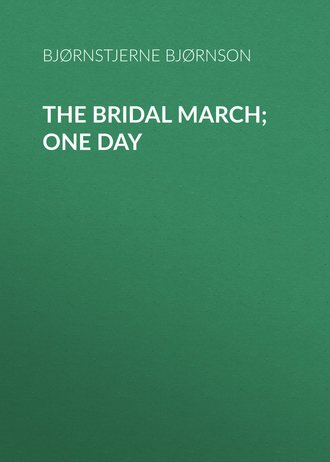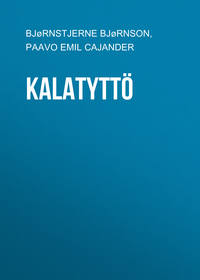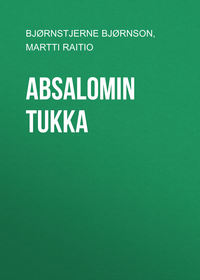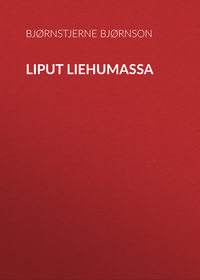 полная версия
полная версияThe Bridal March; One Day
"If the family of Tingvold have never asked after the Haugen people, the fault is not ours; we have been poor people till these last years."
In these few words lay a reproach that was felt by all three to be deserved, and that thoroughly. But never till now had it occurred to either husband or wife that they had been in this case neglecting a duty; never till now had they reflected that their poor relations at Haugen should not have been made to suffer for misfortunes of which they had been in no way the cause. They stole an awkward glance at each other, and sat still, feeling real shame. Hans had spoken quietly, though Randi's words must have been very irritating to him. This made both the old people feel that he was a fine fellow, and that they had two wrongs to make good again. Thus it came about that Endrid said:
"Let us take time and think things over; can't you stay here and have dinner with us? Then we can talk a little."
And Randi added: "Come away here and sit down."
Both of them rose.
Hans set away the gun with his cap on it, and went forward to the bench on which Mildrid was sitting, whereupon she at once got up, she did not know why. Her mother said she had things to see to in the kitchen, and went out. Her father was preparing to go too; but Mildrid did not wish to be alone with Hans as long as her parents withheld their consent, so she went towards the other door, and they presently saw her crossing the yard to her grandmother's house. As Endrid could not leave Hans alone, he turned and sat down again.
The two men talked together about indifferent matters—first it was about the hunting, about the Haugen brothers' arrangements in the little summer huts they had high up on the mountains, about the profits they made by this sort of thing, &c. &c. From this they came to Haugen itself, and the tourists, and the farm management; and from all he heard Endrid got the impression of there being prosperity there now, and plenty of life. Randi came backwards and forwards, making preparations for the dinner, and often listened to what was being said; and it was easy to see that the two old people, at first so shy of Hans, became by degrees a little surer of him; for the questions began to be more personal.
They did not fail to observe his good manners at the dinner-table. He sat with his back to the wall, opposite Mildrid and her mother; the father sat at the end of the table on his high seat. The farm people had dined earlier, in the kitchen, where indeed all in the house generally took their meals together. They were making the difference to-day because they were unwilling that Hans should be seen. Mildrid felt at table that her mother looked at her whenever Hans smiled. He had one of those serious faces that grow very pleasant when they smile. One or two such things Mildrid added together in her mind, and brought them to the sum she wanted to arrive at. Only she did not feel herself so sure, but that the strain in the room was too great for her, and she was glad enough to escape from it by going after dinner again to her grandmother's.
The men took a walk about the farm, but they neither went where the people were working, nor where grandmother could see them. Afterwards they came and sat in the room again, and now mother had finished her work and could sit with them. By degrees the conversation naturally became more confidential, and in course of time (but this was not till towards evening) Randi ventured to ask Hans how it had all come about between him and Mildrid; Mildrid herself had been able to give no account of it. Possibly it was principally out of feminine curiosity that the mother asked, but the question was a very welcome one to Hans.
He described everything minutely, and with such evident happiness, that the old people were almost at once carried away by his story. And when he came to yesterday—to the forced march Beret had made in search of him because Mildrid was plunged in anguish of mind on her parents' account—and then came to Mildrid herself, and told of her ever-increasing remorse because her parents knew nothing; told of her flight down to them, and how, worn-out in soul and body, she had had to sit down and rest and had fallen asleep, alone and unhappy—then the old people felt that they recognised their child again. And the mother especially began to feel that she had perhaps been too hard with her.
While the young man was telling about Mildrid, he was telling too, without being aware of it, about himself; for his love to Mildrid showed clearly in every word, and made her parents glad. He felt this himself at last, and was glad too—and the old couple, unaccustomed to such quiet self-reliance and strength, felt real happiness. This went on increasing, till the mother at last, without thinking, said smilingly:
"I suppose you've arranged everything right up to the wedding, you two—before asking either of us?"
The father laughed too, and Hans answered, just as it occurred to him at the moment, by softly singing a single line of the Wedding March,
"Play away! speed us on! we're in haste, I and you!"and laughed; but was modest enough at once to turn to something else. He happened accidentally to look at Randi, and saw that she was quite pale. He felt in an instant that he had made a mistake in recalling that tune to her. Endrid looked apprehensively at his wife, whose emotion grew till it became so strong that she could not stay in the room; she got up and went out.
"I know I have done something wrong," said Hans anxiously.
Endrid made no reply. Hans, feeling very unhappy, got up to go after Randi and excuse himself, but sat down again, declaring that he had meant no harm at all.
"No, you could hardly be expected to understand rightly about that," said Endrid.
"Can't you go after her and put it right again!"
He had already such confidence in this man that he dared ask him anything.
But Endrid said: "No; rather leave her alone just now; I know her."
Hans, who a few minutes before had felt himself at the very goal of his desires, now felt himself cast into the depths of despair, and would not be cheered up, though Endrid strove patiently to do it. The dog helped by coming forward to them; for Endrid went on asking questions about him, and afterwards told with real pleasure about a dog he himself had had, and had taken much interest in, as is generally the way with people leading a lonely life.
Randi had gone out and sat down on the doorstep. The thought of her daughter's marriage and the sound of the Bridal March together had stirred up old memories too painfully. She had not, like her daughter, given herself willingly to a man she loved! The shame of her wedding-day had been deserved; and that shame, and the trouble, and the loss of their children—all the suffering and struggle of years came over her again.
And so all her Bible-reading and all her praying had been of no avail! She sat there in the most violent agitation! Her grief that she could thus be overcome caused her in despair to begin the bitterest self-accusation. Again she felt the scorn of the crowd at her foolish bridal procession; again she loathed herself for her own weakness—that she could not stop her crying then, nor her thinking of it now—that with her want of self-control she had cast undeserved suspicion on her parents, destroyed her own health and through this caused the death of the children she bore, and lastly that with all this she had embittered the life of a loving husband, and feigned a piety that was not real, as her present behaviour clearly showed!
How dreadful that she still felt it in this way—that she had got no farther!
Then it burst upon her—both her crying in church and the consuming bitterness that had spoiled the early years of her married life had been wounded vanity. It was wounded vanity that was weeping now; and that might at any moment separate her from God, her happiness in this world and the world to come!
So worthless, so worthless did she feel herself that she dared not look up to God; for oh! how great were her shortcomings towards Him! But why, she began to wonder, why had she succumbed just now—at the moment when her daughter, in all true-heartedness and overflowing happiness, had given herself to the man she loved? Why at this moment arouse all the ugly memories and thoughts that lay dormant in her mind? Was she envious of Mildrid; envious of her own daughter? No, that she knew she was not—and she began to recover herself.
What a grand thought it was that her daughter was perhaps going to atone for her fault! Could children do that? Yes, as surely as they themselves were a work of ours, they could—but we must help too, with repentance, with gratitude! And before Randi knew what was happening, she could pray again, bowing in deep humility and contrition before the Lord, who had once more shown her what she was without Him. She prayed for grace as one that prays for life; for she felt that it was life that was coming to her again! Now her account was blotted out; it was just the last settling of it that had unnerved her.
She rose and looked up through streaming tears; she knew that things had come right now; there was One who had lifted the burden of pain from her!
Had she not had the same feeling often before? No, never a feeling like this—not till now was the victory won. And she went forward knowing that she had gained the mastery over herself. Something was broken that till now had bound her—she felt with every movement that she was free both in soul and body. And if, after God, she had her daughter to thank for this, that daughter should in return be helped to enjoy her own happiness to the full.
By this time she was in the passage of grandmother's house; but no one in the house recognised her step. She took hold of the latch and opened the door like a different person. "Mildrid, come here!" she said; and Mildrid and her grandmother looked at each other, for that was not mother. Mildrid ran to her. What could be happening? Her mother took her by the arm, shut the door behind her, so that they were alone, then threw her arms round her neck, and wept and wept, embracing her with a vehemence and happiness which Mildrid, uplifted by her love, could return right heartily.
"God for ever bless and recompense you!" whispered the mother.
The two sitting in the other house saw them coming across the yard, hand in hand, walking so fast that they felt sure something had happened. The door opened and both came forward. But instead of giving her to Hans, or saying anything to him or Endrid, the mother just put her arms once more round her daughter, and repeated with a fresh burst of emotion: "God for ever bless and reward you!"
Soon they were all sitting in grandmother's room. The old woman was very happy. She knew quite well who Hans Haugen was—the young people had often spoken about him; and she at once understood that this union wiped out, as it were, much that was painful in the life of her son and his wife. Besides, Hans's good looks rejoiced the cheery old woman's heart. They all stayed with her, and the day ended with father, after a psalm, reading from a prayer-book a portion beginning: "The Lord has been in our house!"
I shall only tell of two days in their life after this, and in each of these days only of a few minutes.
The first is the young people's wedding-day. Inga, Mildrid's cousin, herself a married woman now, had come to deck out the bride. This was done in the store-house. The old chest which held the family's bridal silver ornaments—crown, girdle, stomacher, brooches, rings—was drawn from its place. Grandmother had the key of it, and came to open it, Beret acting as her assistant. Mildrid had put on her wedding-dress and all the ornaments that belonged to herself, before this grandeur (well polished by Beret and grandmother the week before) came to light, glittering and heavy. One after another each ornament was tried. Beret held the mirror in front of the bride. Grandmother told how many of her family had worn these silver things on their wedding-day, the happiest of them all her own mother, Aslaug Haugen.
Presently they heard the Bridal March played outside; they all stopped, listened, and then hurried to the door to see what it meant. The first person they saw was Endrid, the bride's father. He had seen Hans Haugen with his brothers and sisters coming driving up the road to the farm. It was not often that any idea out of the common came to Endrid, but on this occasion it did occur to him that these guests ought to be received with the March of their race. He called out the fiddlers and started them; he was standing beside them himself, and some others had joined him, when Hans and his good brothers and sisters, in two carriages, drove into the yard. It was easily seen that this reception touched them.
An hour later the March of course struck up again. This was when the bride and bridegroom, and after them the bride's parents, came out, with the players going before them, to get into the carriages. At some great moments in our lives all the omens are propitious; to-day the bridal party drove away from Tingvold in glorious spring weather. The crowd at the church was so great that no one remembered having seen the like of it, on any occasion. And in this gathering each person knew the story of the family, and its connection with the Bridal March which was sounding exultantly in the sunshine over the heads of bride and bridegroom.
And because they were all thinking of the one thing, the pastor took a text for his address that allowed him to explain how our children are our life's crown, bearing clear witness to our honour, our development, our work.
On the way back from the altar Hans stopped just outside the church-door; he said something; the bride, in her superhuman happiness, did not hear it; but she felt what it was. He wished her to look at Ole Haugen's grave, how richly clad in flowers it lay to-day. She looked, and they passed out almost touching his headstone; the parents following them.
The other incident in their life that must be recalled is the visit of Endrid and Randi as grandparents. Hans had carried out his determination that they were to live at Haugen, although he had to promise that he would take Tingvold when the old people either could or would no longer manage it, and when the old grandmother was dead. But in their whole visit there is only one single thing that concerns us here, and that is that Randi, after a kind reception and good entertainment, when she was sitting with her daughter's child on her knee, began rocking it and crooning something—and what she crooned was the Bridal March. Her daughter clasped her hands in wonder and delight, but controlled herself at once and kept silence; Hans offered Endrid more to drink, which he declined; but this was on both sides only an excuse for exchanging a look.
ONE DAY
CHAPTER I
Ella was generally known as the girl with the plait. But, thick as the plait was, if it had belonged to any one less shapely, less blonde, less sprightly, hardly any one would have noticed it; the merry life which it led behind her would have passed unobserved, and that, although it was the thickest plait which any one in the little town had ever boasted. Perhaps it looked even thicker than it really was, because Ella herself was little. It is not necessary to give its exact length, but it reached below her waist; a long way below it. Its colour was doubtful but inclined a little to red, though people in the town generally called it light, and we will accept their dictum without going into the question of half-tones. Her face was noticeable for its white skin, pretty shape, and classic profile; she had a small, full mouth, and eyes of unusual frankness, a trim little figure, but with rather short legs, so that in order to get over the ground as fast as it was her nature to do, her feet had to move very quickly. She was quick, indeed, in everything which she undertook, and that no doubt was why the plait was busier than plaits are wont to be.
Her mother was the widow of a government official, had a small fortune besides her pension, and lived in her own little house opposite the hotel close by the market. She was an unassuming woman, whose husband had influenced her in everything; he had been her pride, her light, and when she lost him, the object of her life was gone; she became absorbed in religion; but, as she was not dictatorial, she allowed her only child—who much resembled her father—to follow her own inclinations. The mother associated with no one except an elder sister, who owned a large farm near the town, but Ella was allowed to bring in her companions from school, boating, skating, and snow-shoeing; this, however, made no difference, for there was an instinctive prudence in her choice of friends; her liveliness was tempered by her mother's society and the quietness of the house. So that she was active and expeditious without being noisy, frank enough, but with self-command and heedfulness.
All the more strange, then, was an incident which occurred when she was between fourteen and fifteen. She had gone with a few friends to a concert which the Choral Society of the town, and one or two amateurs, were giving in aid of the Christmas charities. At this concert, Aksel Aarö sang Möhring's "Sleep in Peace." As every one knows, a subdued chorus carries the song forward; a flood of moonlight seemed to envelop it, and through it swept Aksel Aarö's voice. His voice was a clear, full, deep baritone, from which every one derived great pleasure. He could have drawn it out, without break or flaw, from here to Vienna. But within this voice Ella heard another, a simultaneous sound of weakness or pain, which she never doubted that everybody could hear. There was an emotion in its depths, an affecting confidence, which went to her heart; it seemed to say, "Sorrow, sorrow is the portion of my life; I cannot help myself, I am lost." Before she herself knew it, she was weeping bitterly. Anything more impressive than this voice she had never experienced. With every note her agitation increased, and she lost all control over herself.
Aarö was of moderate height, and slender, with a fair, silky beard, which hung down over his chest; his head was small, his eyes large and melancholy, with something in their depths which, like the voice, seemed to say "Sorrow, sorrow." This melancholy in the eyes she had noticed before, but had not fully understood it until now, when she heard his voice. Her tears would flow. But this would not do. She glanced quickly round; no one else was crying. She set her teeth, she pressed her arms against her sides, and her knees together till they ached and trembled. Why in the world should this happen to her and to no one else? She put her handkerchief to her lips, and forced herself to think of the beam of light which she had seen flash out from the lighthouse and disappear again, leaving the sea ghostly in the darkness. But no! her thoughts would return; they would not be controlled. Nothing could check the first sob, it would break out. Before all the astonished eyes she rose, left her seat, slipped quietly from the room and got away. No one came with her; no one dared to be seen near her.
You who read this, do you realise how dreadful it was? Have you been to such a—I had nearly written silent—concert, in a Norwegian coast town of somewhat pietist savour? Hardly any men are present. Either music is not to the masculine taste in the coast towns, or they are in some other part of the club, at billiards, or cards, or in the restaurant drinking punch, or reading the papers. Two or three perhaps have come up for a moment, and stand near the door, stand like those to whom the house belongs, and who wish to have a look at the strangers; or there really are one or two men sitting on the benches, squeezed in among the many coloured dresses, or else a few specimens are seen round the walls, like forgotten overcoats.
No! those who gather at the concerts are from the harems of the place; their elder inhabitants come to dream again, amidst beautiful words and touching music, of what they once persuaded themselves that they were, and what they had once believed was awaiting them. It is a harmless passing amusement. In the main they are better understood up above than here below, so that if a whiff of the kitchen or a few household worries do find their way into the dreams, it does not disturb them. The younger denizens of the harems dream that they are what the elders once believed themselves, and that they will attain at least to something of what the eldest have never reached. They had gained some information about life. In one thing old and young resemble each other; they are practical and prosperous by descent. They never allow their thoughts to stray very far. They know quite well that the glow which they feel as they listen to the words and music of great minds is not to be taken too seriously; it is only "What one always feels, you know."
When, therefore, one among them took this really seriously and began to cry about it, good gracious! In private it was called "foolery," in public "scandalous."
Ella had made a spectacle of herself. Her own dismay was immeasurable. No girl that she knew was less given to tears than herself; that she was certain of. She had as great a dread as any one of being looked at, or talked about. What in the world was it then? She was fond of music, certainly; she played herself, but she did not believe that she had any remarkable gift. Why, then, should she especially have been overcome by his song? What must he think of the silly girl? This thought troubled her most, and on this point she dare not confide in any one. Most people concluded that she had been ill, and she actually did keep indoors for a few days, and looked pale when she reappeared. Her friends teased her about it, but she let the matter drop.
In the winter there were several children's dances, one of which was at "Andresen's at the corner," and Ella was there. Just at the conclusion of the second quadrille, she heard whispered "Aksel Aarö, Aksel Aarö!" and there he stood at the door, with three other young fellows behind him. The hostess was his elder sister. The four had come up from a card party to look on.
Ella felt a thrill of delight, and at the same time her knees threatened to give way under her. She could neither see, nor understand clearly, but she felt great eyes on her. She was engrossed in a fold of her dress which did not hang properly, when he stood before her and said, "What a beautiful plait you have." His voice seemed to sprinkle it with gold-dust. He put out his hand as though he were going to touch it, but instead of doing so he stroked his beard. When he noticed her extreme timidity, he turned away. Several times during the evening she felt conscious of his presence; but he did not come up to her again.
The other men took part in the dancing, but Aarö did not dance. There was something about him which she thought specially charming; a reserved air of distinction, a polish in his address, a deference of that quiet kind which alone could have appealed to her. His walk gave the impression that he kept half his strength in reserve, and this was the same in everything. He was tall, but not broad-shouldered; the small, somewhat narrow head, set on a rather long neck. She had never before noticed the way in which he turned his head. She felt now that there could be something, yes, almost musical about it.
The room, and all that passed in it, seemed to float in light, but suddenly this light was gone. A little later she heard some one say, "Where is Aksel Aarö? Has he left?"
Aarö was not at home for very long that winter. He had already spent two years at Havre, from which place he had recently returned; he was now going for a couple of years to Hull. Before this, music had been a favourite pursuit with Ella; she had especially loved and studied harmony, but from this time forward she devoted herself to melody. All music had given her pleasure and she had made some progress in it; but now it became speech to her. She herself spoke in it or another spoke to her. Now, whoever she was with, there was always one as well, she was never alone now, not in the street, not at home; of this the plait was the sacred symbol.
In the course of the spring Fru Holmbo met Ella in the street as she was coming from the pastor's house with her prayer-book in her hand.









